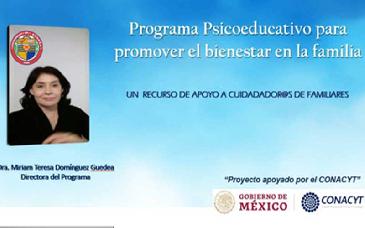

Published note: 2021-01-11
Hermosillo, Sonora, January 11, 2020.- The University of Sonora has available to the whole community the Psychoeducational Program to promote well-being in the family. A resource to support family caregivers -adults adults and children- effort led by Miriam Teresa Domínguez Guedea, professor of the Department of Psychology and Communication Sciences.
This program can be taken free of charge by those who have an interest in the subject and especially by people who take care of their elderly relatives, children and / or adolescents.
“This action consists of a series of animated videos on a Youtube channel that offers psychological guidance for managing the well-being of those who care for other people,” he said.
He indicated that the contents will include bases for understanding the crisis in human experience, foundations and strategies to strengthen well-being and psychological resources, enhance communication aimed at appreciative understanding of emotional needs, as well as resolving skills in management. of difficulties.
At the same time, he noted that the invitation has been extended to all people to visit the Care for Families YouTube channel (www.youtube.com/channel/UCF6VmhiWSf9GXfFbuE2AhhA), as well as make use of this support resource for all community. The video presentation of the Program is at: www.youtube.com/watch?v=IXwVM_1-V78.
The academic of the Postgraduate in Health Sciences stressed that the project was supported by the National Council of Science and Technology (Conacyt), if Call for Projects for Universal Access to Knowledge in the Face of Emergency covid-19.
Importance of the program
Domínguez Guedea commented that worldwide the number of older adults requiring daily care is increasing, and that in Latin American countries this process is worrying, given the social and health difficulties experienced by a significant part of the population.
To this circumstance, he added, is added the current health crisis for covid-19, in which people aged 60 and over are among the groups most vulnerable in terms of morbidity and mortality.
“Daily care tends to generate significant economic, physical and emotional demands, which are commonly absorbed by one or a few family members, mostly women, middle-aged, with additional working hours for employment, domestic demands and care in addition family members; for example, minors, “she said.
He argued that in Latin contexts there are still sociocultural premises that normalize this overload of tasks as a responsibility that competes only with those who care, and that consequently the mechanisms of social and institutional support are scarce.
“Thus, it is not surprising that caregivers feel stressed in the face of the amount and diversity of demands they face on a day-to-day basis,” he indicated. Therefore, the Psychoeducational Program offers a support resource that enhances the capacities of caregivers to cope with the changes that daily care imposes, even more so in these times of pandemic.
Project collaborators:
Miriam Teresa Domínguez referred to the fact that the project has had the valuable collaboration of academics and students from the Department of Psychology and Communication Sciences and the Postgraduate in Health Sciences from the University of Sonora. , researchers from the College of Sonora, professionals from the General Directorate of Health Promotion and Disease Prevention of the Secretary of State for Health, as well as psychotherapists from Civil Society Organizations (Jiapsi-Center for Personal Development, Family and Couple, AC, Sound Network of Psychosocial Support in Crisis, AC, and Dorita d’Ojeda Therapy and Rehabilitation Center).
They have also shared their experience and knowledge for the integration of program content, caregivers, children, adolescents and older adults from different parts of the republic.
He also highlighted the work of academic Marcela Martínez Preciado and student Ana Abygail Guzmán Rius, of the Digital Content Production Laboratory of the Degree in Communication Sciences, who produced the videos that they make up the psychoeducational series.